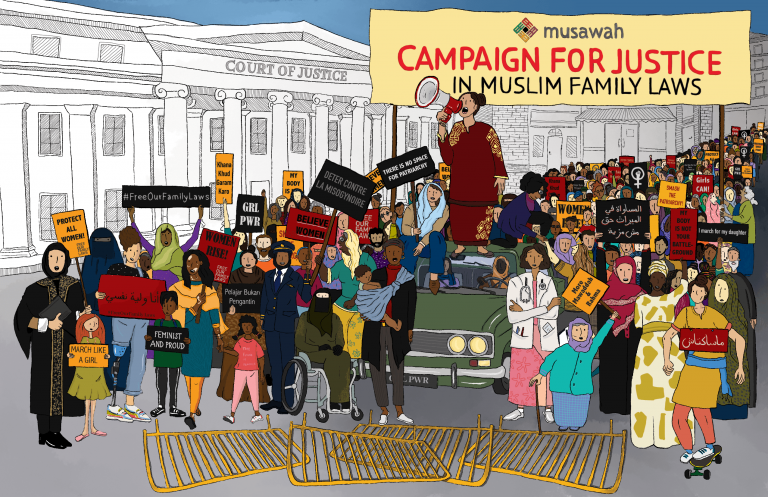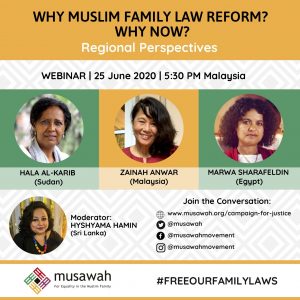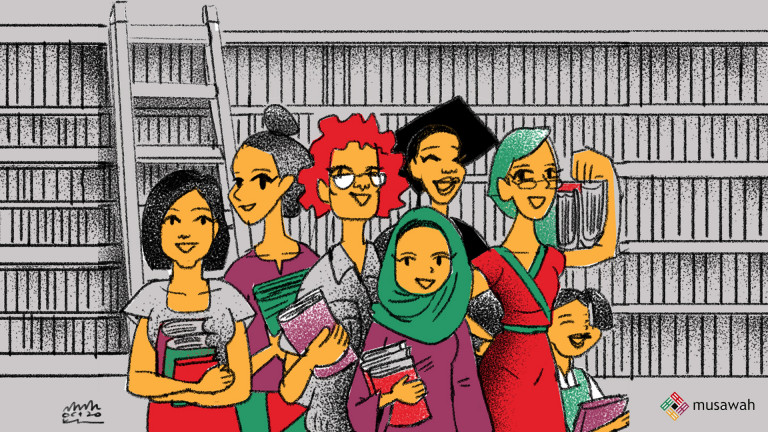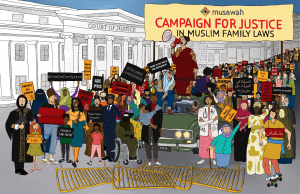By Hyshyama Hamin, Coordinator – Campaign for Justice in Muslim Family Laws

Happy International Day of Families!
Exactly a year ago, Musawah launched the Campaign for Justice (CFJ) in Muslim Family Laws, two months after its intended launch in March 2020 at the 64th session of the Commission on the Status of Women (CSW). Making the decision to launch a global campaign while the world was enduring a pandemic was not an easy one—countries were going through health emergencies and lockdowns, but evidence emerged very early on that women and girls were disproportionately affected by the pandemic. As our Executive Director Zainah Anwar said in her CFJ explainer video:
“It is all the more urgent now to deal with the inequalities and injustices that have come up because of the impact of COVID-19. The move towards social justice has to include women’s right to be treated as human beings of equal worth and dignity.”
Felukah, a young Egyptian artist, musician,s and songwriter, further expresses this point in this amazing music video “Mesh Hastana (I won’t wait)”, brilliantly illustrated by Rama Duwaji from Syria:
“On certain days
It feels like the whole world just works against me
I start to ask myself
Where does this injustice really stem from?
God graced me with dignity just like you
I’m awake and on the move
But I won’t wait
These problems won’t miraculously fix themselves”
Muslim Family Laws and the COVID-19 Pandemic
The COVID-19 pandemic spotlighted ‘home’ and ‘family’ as important places of health, wellbeing, and security for people. In doing global advocacy on Muslim family law reform, it was important for us to understand the intersection between Muslim family laws and the impacts on women.
From July to September 2020, with the support of our advocates, we conducted a study on the impacts of the COVID-19 pandemic on women living under discriminatory Muslim family laws. The study aimed to be qualitative; hence, we administered an in-depth, targeted survey of women’s rights activists from 12 countries in the South Asian, Southeast Asian, and Middle East & North Africa (MENA) regions, followed by a secondary literature review and additional research on emerging information. In December 2020, we published the study entitled, ‘Survey findings on the impacts of COVID-19 on women living under discriminatory family laws.’
Many of the issues identified by activists were ones that were exacerbated by discriminatory provisions and procedures in family laws. The fact that child and forced marriages, polygamy, and unequal divorce are allowed by Muslim family laws under normal circumstances meant that the pandemic offered additional reasons, factors, and excuses for such practices to occur in greater numbers and with greater consequences.
Read these articles by Marwa Sharafeldin, Musawah Senior Technical Advisor for the MENA region:
Organising and Mobilising Online
As the world moved to online platforms such as Zoom to meet and gather, so did we! As part of the CFJ, Musawah continued to have regular regional outreach calls with advocates from South and Southeast Asia and the MENA regions. These calls have created a space where activists working on Muslim women’s rights and family law reforms can have critical conversations about family law issues, learn from legislation and practices in each other’s contexts, share strategies for reform, and stay updated about the latest family law reform processes.
We also held key online events highlighting Muslim family law reform as a global issue of concern:
i) Webinars on Muslim family law reform

One of the webinars we held last year, “Why Muslim Family Law Reform? Why Now? Regional Perspectives”
- CFJ in Muslim Family Laws online launch: Why Muslim Family Law Reform? Why Now? Regional Perspectives
- Indian Muslim Women’s Movement – In partnership with Harvard Programme on Law and Society and Bharatiya Muslim Mahila Andolan
- Muslim Women Creating New Futures – In partnership with Harvard Programme on Law and Society
- Societal Shapers: Campaign For Justice in Muslim Family Law with Suri Kempe
- #TELENISATELLS LIVE SIRI 15: Pembaharuan Undang-Undang Keluarga Islam, Bersediakah Kita?
ii) Global Conference on Muslim Family Law reform
In October 2020, the Global Conference on Muslim Family Law Reform was the first of its kind for Musawah, and the first one to be held online. The 5-day conference featured a combination of closed and open sessions; approximately 65 activists from 30 countries regularly attended the closed sessions, and an average of 100 participants attended the open sessions. Together we created a vibrant and compassionate feminist space online, with lively engagement, sharing, and learning.
The four public Global Conference webinars included:
The intersections of art and activism were also explored through this curated Artivism Gallery.
One key outcome of the Global Conference was the formation of thematic groups on priority family law topics that were determined by the participants based on emerging issues:
- Violence against women in the family,
- Financial rights at the time of divorce (with a focus on matrimonial property and inheritance),
- Comprehensive reform of Muslim family laws, and
- Access to justice (on family law matters).
Participants from all four thematic groups brainstormed specific action points for collaboration as part of the CFJ in 2021 and beyond.
iii) MENA Regional Workshop on Muslim Family Laws
In April 2021, Musawah, in partnership with Equality Now, the Jordanian National Women’s Commission, and UN Women Arab States, organised and hosted a 3-day online regional workshop on Muslim family laws for approximately 50 activists, advocates, and policy makers from 12 countries in the MENA region. Through this workshop, participants working in the field of women’s rights shared and built their knowledge on the necessity for reform, identified key challenges and good practices in national contexts and at the regional level, and developed strategies for family law reform.
In this protracted pandemic, with borders and travel still closed, the CFJ will have to be purely digital for at least the remainder of 2021. So we have been researching, exploring, and brainstorming with national advocates about how we can best use online spaces to share, learn, and do advocacy. Starting in June 2021, we will launch the CFJ webinar series to highlight the impacts of discriminatory family laws on women, share and amplify national campaigns on family law reform, and push the global conversation on this issue. Stay tuned for more information!
Knowledge resources on Muslim Family Laws
Musawah’s foundational premise has been that knowledge is key—to understanding the issues, preparing the evidence, formulating strategies, creating public discourse, and advocating for Muslim women’s rights (in this case Muslim family law reforms). As such, we also have been producing policy briefs on the main family-law-related issues of concern. To date, we have released the following policy briefs, available in English and Arabic:
Policy Brief 1: ‘Why Muslim Family Law Reforms? Why Now?’
Policy Brief 2: ‘Ending Child Marriage in Muslim Family Laws’
Policy Brief 3: ‘Ending Polygamy in Muslim Marriages’
Policy Brief 4: ‘Equal Divorce Rights in Muslim Family Laws’
Articles by Rasha Dewedar, Musawah Communications Officer, on family law related issues and their impacts on Muslim women:
تعتبر الرجل حسابًا بنكيًا والمرأة عاملة منزلية.. لماذا يجب تغيير قوانين الأحوال الشخصية؟
هتك للطفولة ونزيف للأحلام… لماذا نصر على زواج الأطفال؟
الثروة المشتركة بين الزوجين… ما لم يخبرك به الشيخ ولا الإمام
Advocacy Toolkit: This year, as we venture into Year 2 of the CFJ, we are releasing an online ‘one-stop shop’ for accessing our knowledge building, advocacy, and capacity building resources for national and regional activists wishing to engage in family law reform. Follow our social media accounts for more updates!

Year Two: Our Work Continues
And here we are, at Year 2 of the CFJ, where many countries in the South and Southeast Asia and MENA regions are currently witnessing horrifying impacts of second and third waves of the COVID-19 pandemic.
We are reminded each and every day of the strength and resilience of civil society groups, activists, frontline workers, and ordinary citizens who are simultaneously fighting the health crisis and dealing with inadequate and callous government policies. Our communities and countries are struggling, and an end to the pandemic is far from sight. Yet, amidst this, we are also reminded that the injustices and discriminations women and girls face in the family are not dropping. In fact, it is increasing exponentially, and these issues need our urgent attention.
This year, we want to support the struggle in forefronting women’s experiences and lived realities. In bridging the gap between laws and policies pertaining to family, and their impacts in everyday lives, we want to advocate more loudly and boldly the need for justice and equality in families, in all their diverse forms, and in reforming discriminatory family laws across Muslim contexts.
In this rapidly changing world, we owe it to ourselves, our sisters, and women and girls of the future, to ensure that laws and policies that govern us treat us as equal human beings. We cannot wait for “better days,” the time is NOW!
#FreeOurFamilyLaws
Get involved with the Campaign for Justice
Want to learn how you can join the Campaign for Justice in Muslim Family Laws? Please email us at [email protected] and our Campaign Coordinator will be in touch! For more information https://www.musawah.org/campaign-for-justice/

